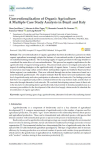Rover O.J., Da Silva Pugas A., de Gennaro B.C., Vittori F., Roselli L. (2020). Conventionalization of organic agriculture : a multiple case study analysis in Brazil and Italy. Sustainability, 10/08/2020, vol. 12, n. 16, p. 1-13.
https://doi.org/10.3390/su12166580
https://doi.org/10.3390/su12166580
| Titre : | Conventionalization of organic agriculture : a multiple case study analysis in Brazil and Italy (2020) |
| Auteurs : | O.J. Rover ; A. Da Silva Pugas ; B.C. de Gennaro ; F. Vittori ; L. Roselli |
| Type de document : | Article |
| Dans : | Sustainability (vol. 12, n. 16, August 2020) |
| Article en page(s) : | p. 1-13 |
| Langues : | Anglais |
| Langues du résumé : | Anglais |
| Catégories : |
Catégories principales 06 - AGRICULTURE. FORÊTS. PÊCHES ; 6.4 - Production Agricole. Système de ProductionThésaurus IAMM DIVERSIFICATION ; AGRICULTURE BIOLOGIQUE ; AGRICULTURE INTENSIVE ; AGROBIODIVERSITE ; SYSTEME ALIMENTAIRE ALTERNATIF ; CIRCUIT DE COMMERCIALISATION ; EXPLOITATION AGRICOLE ; ZONE RURALE ; CIRCUIT DE DISTRIBUTION ALTERNATIF ; VENTE DIRECTE ; CIRCUIT COURT ; BRESIL ; ITALIE |
| Résumé : | The conventionalization of organic agriculture has been described as a process in which organic agriculture increasingly adopts the features of conventional modes of production based on industrial farming methods. The increasing supply of organic products to the large retailers is considered the main driver of conventionalization. This process has negative implications for the agrobiodiversity of organic farming systems. The present study aims to investigate and analyze the impact of retailing strategies on the agrobiodiversity of organic farms. A survey of farms located in rural areas near large urban centers (three metropolitan regions in Southern Brazil and four Italian regions) was undertaken. Data was collected through face-to-face interviews based on a semi-structured questionnaire. The analysis indicates that the farms surveyed maintained a high level of agrobiodiversity and active participation in alternative food networks. Our findings point out that there was a significant and positive correlation between the crop richness index and the share of farm sales through alternative food networks. We conclude that adopting various forms of direct sale is the key factor in stimulating farms’ agrobiodiversity, but proximity to densely populated areas is a necessary precondition for the development of the short food supply chains needed to stimulate the diversification of organic agriculture. |
| Cote : | En ligne |
| URL / DOI : | https://doi.org/10.3390/su12166580 |







